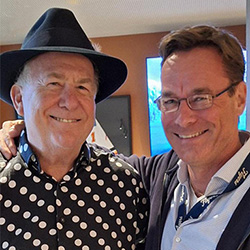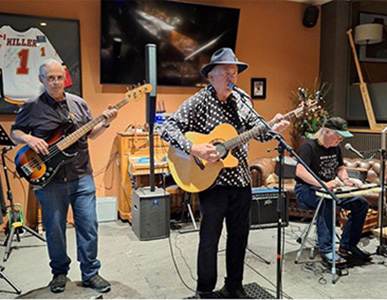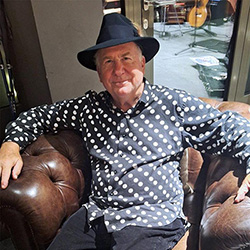- Home
- Biography
- Shows
- Blog
- Gallery
- Videos
- Lone Star Reunion Concert NYC
- Proud To Be A Moose
- Willie on Greenwich Village Folk Festival (YouTube)
- Willie Nininger Interview
- Niningers on Hee Haw
- Eugene & Jim Nininger on The Robert Klein Show
- Swiss Interview
- I'll Tell Me Ma
- Valerie
- Mr. Cellophane
- The Willie & Jan Band
- Spotlight on Connecticut
- 'On A Winter's Night' Christine Lavin
- The Willie & Jan Band
- Contact
Willie Nininger
Willie Nininger, is a singer, songwriter and guitar player, with origins in New York. Coming from the US, surrounded by a musical family – his father was a doctor but also a violinist – Nininger started his musical career in Switzerland in the early Eighties, playing for the luxury Hotel Jungfrau Victoria in Interlaken, then performing at all the ‘in’ places, especially in the Berner Oberland, but also elsewhere in Switzerland. In 1993 he won 1st prize at the Swiss Music Awards in Zurich. After a short time he got massively popular within his fan audience, and he lived for years on the relatively isolated Brunig Pass in the Swiss Alps. Nowadays Nininger looks back on a great career as a guitar player and songwriter. He is still active in Switzerland and is actually touring here in September 2025.
In the interview with Christian Dueblin, Willie Nininger, a musician with a literature degree in his pocket, talks about his music career, his love and appreciation for Bob Dylan, and his band members and other musical influences. Due to a series of concerts in Switzerland in September 2025, Willie Nininger has once again made himself available for an interview.
Some time ago, Christian Dueblin asked Willie Nininger whether the Nobel Prize in Literature, which was awarded to Bob Dylan in 2016, was justified and well-founded. You can find a transcript of this conversation in the interview text. Willie Nininger has spent his entire life studying Bob Dylan and his career, not only from a musical perspective, but also from a literary one.
Willie Nininger will be playing at the Restaurant des Alpes in Interlaken on September 11, 2025, and at the Avocado Bar in Grindelwald on September 13, 2025.
Willie Nininger with Christian Dueblin( Xecutives.net)
Xecutives.net: Dear Willie, it is great to have you again in Switzerland and I’m very happy to have the opportunity to ask you some questions. You are my favorite American fan of Switzerland. You lived in Switzerland for many years and have had close ties to the Bernese Oberland – for over 40 years. How does it feel to be able to play in the Bernese Oberland again with your band?
Willie Nininger: I feel very thankful to still be able to come back to Switzerland almost every year and play with many of my original band members. Karl Guntern (from Stechelberg) has been playing bass with me since late 1993. He has also handled most of our bookings from almost that time and continues to do so to this day. I can’t overestimate what a great help he has been to me as a band member, organizer and a friend.
Xecutives.net: You always play with the same highly talented musicians, including Putzie Mayr. How did you meet these musicians?
Willie Nininger: I met Putzie Mayr (originally from Lausanne) who plays lap steel and accordion, when I was playing at the Western Saloon in Montreux which was on the bottom floor of the Casino there. I was immediately impressed with his ability to play behind the beat which is especially useful when I start to play a song that the band has never heard before. This is a bad habit of mine. Sometimes I will suddenly think of a song in the middle of the show that I want to perform immediately and I will say to the band: “This is in the key of G: good luck”. (laughs).
Kirby Bivans, who is from Chicago and lives near Geneva, has been playing with us since the 90s also. Unlike some drummers, he has a great sense of dynamics and like Putzie and Karl, he is very adept at following me when I abruptly switch musical gears. He is also a great help with his high harmonies.
Another key person in my Swiss musical history has been Christian Riesen from Boenigen. He used to sit in with us at the Western Saloon in Interlaken and helped me make the transition from the agency that originally booked me in Interlaken. Although their agents regularly renewed my contract there, they consistently neglected to follow up on frequent offers that I received to play at other venues. Once I parted ways with this agency, Chrigel put me up at his house with other musicians that I brought over from the states and would somehow convince various hotels that never had live music before to book us for 2 or 3 weeks at a time. He also got me into the Swiss Country Festival music circuit by entering us into a contest for the Swiss Music Awards in Zurich. He advised me to write a Cajun style song in 3 part harmony with a catchy chorus which I did although I had never been to New Orleans, and we won 1st prize. This led to appearances on Swiss National Televison and many booking at large Country festivals in Switzerland, France and Germany. I stayed in Switzerland until 2002 when I returned to the USA to attend to some family matters.
I have been fortunate enough to have played music full time for over 40 years. My big break was when I was 25 and got the chance to write 5 songs for the national televised children’s program “The Captain Kangaroo Show”. During this time, I was also active in the Fast Folk singer-songwriter scene in New York City and also appeared on the Nashville television show Hee Haw.
Xecutives.net: You are not only a very skilled professional musician, but you also have a literature degree in you pocket. I am always amazed by your repertoire. There is hardly a well-known song that you don’t know. How many songs do you have in your repertoire and how do you choose the songs when you play in Switzerland?
Willie Nininger: Luckily, I have been blessed with a very good memory and still can remember the music and lyrics to hundreds of songs that I have learned over the years by many of my favorite songwriters including Bob Dylan, The Beatles, James Taylor, Joni Mitchell, Steve Goodman, John Prine, Willie Nelson, Roger Miller, Kris Kristoferson, Jim Lauderdale, Loudon Wainwright, Todd Snider, Jackson Browne, Paul Simon, Steve Earle, Cat Stevens, Cole Porter and many others as well as many of my own songs that I still continue to work on from time to time.
As for playing in Switzerland, I usually don’t specifically construct my musical program for any particular audience, and due to the flexibility (and general ability) of the musicians I play with, I rarely even make up a set list in advance and choose the numbers I perform as the show progresses, depending on the reaction of the audience. Having said that, I will admit that I’ve found it is almost always a good idea to, at some point, play the John Denver song: “Country Roads”– and anything by Elvis Presley.
The studied literary scientist Willie Nininger has been playing his guitar for decades and he is a big fan of Bob Dylan, whose songs he also plays on his guitar. But he not only knows the sheet music, he has also intensively studied the Nobel Prize winner’s lyrics. During a conversation in the Bernese Oberland some time ago, Christian Dueblin asked him what he thought of the Nobel Prize, which Dylan had not accepted personally in 2016.
Christian Dueblin: We have often talked about Bob Dylan, whom you like very much, along with other musicians such as Kris Kristoferson, and whom you interpret very well. What is it that interests and attracts you specifically about Bob Dylan?
Willie Nininger: I first started listening to Bob Dylan when my uncle gave me his 4th album „Another Side of Bob Dylan“ for Christmas. By this time, Dylan had mostly already moved away from „protest“ material and it was the last record that he made for a long time without other musical accompaniment. I had heard his songs „Blowin‘ in the Wind“, „Don’t Think Twice“ and „When the Ship Comes In“ from the group Peter, Paul and Mary. They had the same manager as Dylan (Albert Grossman) and he astutely surmised that Dylan’s songs would reach a bigger public with a more conventional production surrounding them. „Blowin‘ in the Wind“ was a huge hit and I think it still stands up today as a special song that is (unfortunately) still relevant to what is happening in the world around us.
I remember listening to this new album many times over and over again and playing along with it on the guitar. The songs were different from what was on the radio, had more sophisticated lyrics, and also had a sense of humor to many of them. But the next three albums „Bringing it all Back Home“, „Highway 61 Revisited“ and „Blonde on Blonde“ were the ones that really got me involved as a fan. These albums were expertly produced with great musicians who complimented the style of the music (which was much more „rocky“ than before), and the songs were full of rich, surreal imagery that surpassed anything else that I had heard previously.
I also liked the way Dylan sang. He didn’t have a conventionally great voice, but I thought his singing was uniquely expressive and very effective in presenting the narrative of the lyrics – and so many lyrics! It seemed to me that these songs were coming from another world. This period also coincided with my beginning to try to write my own songs, so these albums were a great inspiration to me.
I also find Dylan very interesting as a character. Although I think he originally consciously crafted his image (for example, telling interviewers he ran away with the circus), he has definitely influenced music and culture in a major way. I still find myself looking at YouTube to see rare out-takes of songs he recorded a long time ago as well as countless interviews and more recent songs that he has written.
And he is STILL producing new material. I can’t say that I like every song he has written, but I have learned and performed many more of his songs than by any other artist, and I am always interested to hear what he has to say about almost anything.
Christian Dueblin: What do you think of the Nobel Prize in Literature he received in 2016? You studied literature yourself and explored Bob Dylan not only musically, but also in terms of his lyrics. We had a brief exchange some time ago, and I asked you then whether the Nobel Prize for Literature, which went to Bob Dylan in 2016, was justified or not. I think many people were very surprised when they heard the news. What is it that sets Bob Dylan apart?
Willie Nininger: As for the „Prize“, I do think he deserves it, simply for the influence he has made on the entire cultural world and the huge body of work he has produced. I think it would have been better if he had responded to the honor in a more conventional way by publicly acknowledging it and actually showing up for the ceremony instead of recording an acceptance speech, but that’s just my opinion about the man versus the artist, which is a whole different discussion that I don’t feel qualified to judge. Some people would say: „Oh, that’s just Bob being Bob“.
Xecutives.net: What are your next plans regarding music and when do you come back to Switzerland?
Willie Nininger: I’ve had a very busy schedule in and around where I live in Connecticut for the past several years playing at a variety of venues. I still perform at outdoor town summer concerts, coffeehouses and private parties by myself or with various combinations of musicians, but I also now have many shows at Senior Centers, Assisted Living places and Retirement homes. As a result of this, I’ve learned a whole new repertoire of older songs by songwriters such as Cole Porter and Irving Berlin.I am frequently joined by the singer-guitarist Jan Scruggs who lives in Woodbury, Connecticut. Our bass player is usually Bill Strohm who lives in Rhinebeck, New York and occasionally the keyboardist Clifford Carter plays with us at the larger shows. I have known Clifford since we were 10 years old and he has played with many well-known musicians including Cyndi Lauper and James Taylor. My brother Jim also sings with us from time to time.
As for the future, I am planning to continue down the same path I am now on for as long as possible. I already have many shows booked for next year and hope to return to Switzerland again in September of 2026. As usual, my goal is to spend more time working on my writing and to play more places where I can play more of my own songs.
Also, I would very much like to sing the National Anthem again for my favorite baseball team “the New York Mets”.
Xecutives.net: Dear Willie, thank you very much for taking the time to do this interview and thank you and your band for the fantastic concert in Interlaken on the 4 of September, especially for John Denver’s song: “Country Roads” you’ve dedicated to our close friend Rosmarie. We enjoyed your music very much and we’re looking forward to welcoming you again in the Bernese Oberland soon!
© 2025 by Christian Dueblin. All rights reserved. Other publications are only allowed with the explicit permission of the author.



